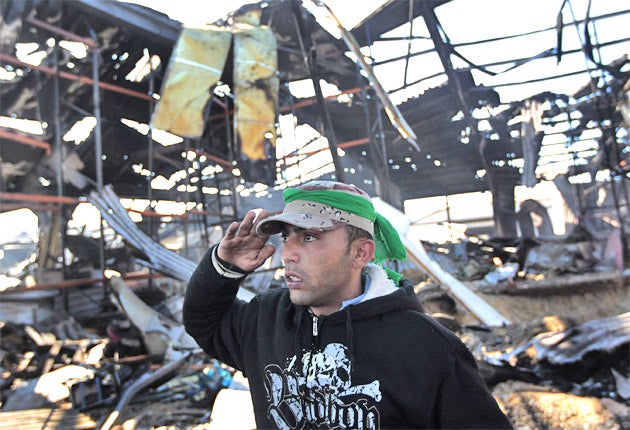Regime takes its revenge on rebels after night of destruction
Allied raids lay waste to armament store as Gaddafi continues onslaught on beseiged city of Misrata

Your support helps us to tell the story
From reproductive rights to climate change to Big Tech, The Independent is on the ground when the story is developing. Whether it's investigating the financials of Elon Musk's pro-Trump PAC or producing our latest documentary, 'The A Word', which shines a light on the American women fighting for reproductive rights, we know how important it is to parse out the facts from the messaging.
At such a critical moment in US history, we need reporters on the ground. Your donation allows us to keep sending journalists to speak to both sides of the story.
The Independent is trusted by Americans across the entire political spectrum. And unlike many other quality news outlets, we choose not to lock Americans out of our reporting and analysis with paywalls. We believe quality journalism should be available to everyone, paid for by those who can afford it.
Your support makes all the difference.Muammar Gaddafi's forces escalated their onslaught on two rebellious redoubts in western Libya yesterday as the regime displayed the devastation wrought by US and European warplanes on an unmistakeably military target.
The attacks on Misrata, a city 130 miles east of Tripoli, and Zintan, a town close to the Tunisian border, came after a third – if somewhat less extensive – night of bombing of Libyan targets, including the destruction of a substantial naval workshop on the Mediterranean shore at the eastern end of the capital.
Reporters were taken to the Abu Sittar base where a combined bombing and cruise missile attack had incinerated four Eastern European Soviet- era missile transporters along with a fire-fighting vehicle and a large truck-mounted rocket launcher, which had apparently been guarding the hangar-sized workshop, now a smouldering ruin. Twisted corrugated iron sheeting hung crazily from steel girders and metal shards were scattered on the ground outside and on the charred floor of the building, and acrid smoke billowed from an adjacent paint shop. The transporters had not apparently been loaded with the missiles at the time though there were a number of other – possibly obsolete – Russian-built missiles on the premises.
Naval officers made no attempt to suggest that there had been casualties, let alone civilian ones, from the bombardment and one, Captain Fahmi Sokni, said that personnel had all been removed before the attack. He said that the missiles had been used for "training" purposes, including in joint exercises with French and Italian forces. "I was here five minutes before the attack," he said, "but we told all the people to get out. They were military people. We are not afraid and we are with our leader. We will carry on."
The developments came amid tentative signs that the Western bombardment had emboldened some civilian opponents of the regime in Tripoli to speak out privately against it. One resident of the capital claimed yesterday that the Libyan leader had only 25 per cent hard core supporters in Tripoli while acknowledging that "people are afraid". Another insisted that most professional people in the city regarded the Libyan leader as a "disaster". Meanwhile, residents in Misrata said the city had been shelled by loyalist forces and that the casualties included four children, who they said were killed when their car was hit, adding to a death toll which they put at 40 during heavy fighting on Monday. It has so far been impossible to verify claims about the conflict in Misrata because reporters are prevented from reaching the city.
One resident, giving his name as Mohammed, told Reuters from a location he said was outside the city's hospital: "The situation here is very bad. Tanks started shelling the town this morning, Snipers are taking part in the operation too. A civilian car was destroyed killing four children... the oldest is aged 13 years."
A government spokesman said on Monday that the town had been "liberated" by pro-Gaddafi forces at the end of last week but that they had subsequently encountered pockets of armed resistance after the Western-led bombing, which included an attack on the city's airport.
Mokhtar Ali, a Libyan dissident in exile elsewhere in the Middle East, said he was in touch with his father in Misrata and said: "Residents live on canned food and rainwater tanks," adding that the regime forces advanced into residential areas knowing that they would not be bombed there. "People live in total darkness in terms of communications and electricity."
A resident of Zintan was quoted as saying that Gaddafi forces were trying to regain the Western rebel-held town in an attack using heavy weapons, and claimed that 10 people were killed yesterday, with many people having fled the town to seek shelter in mountain caves.
During a trip to Tunisia, the UN Secretary-General Ban Ki-moon said: "Until [Col Gaddaffi] stops, I think that this military operation to enforce a no-fly zone will have to continue."
He said that the military operation was neither an interference in Libya's internal affairs nor an "occupation by foreign forces". It was "simply protecting the civilian population".
Join our commenting forum
Join thought-provoking conversations, follow other Independent readers and see their replies
Comments